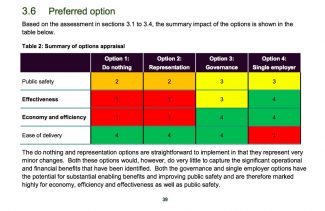Local Business Case for Joint Governance of Police and Fire & Rescue in Essex
Questions for consideration


In the local library, a leaflet on the proposal to change the governance of Fire Services and Police Services is available* and there is a related Consultation document to send back to the Office of the Police and Crime Commissioner. There is a 68 page Local Business Case which delves into four options. The consultation offers a chance to comment on three of them.
Extracts from the Local Business Case are on the attachment, below, with notes. A brief reading of the full 68 page Local Business Case prompted the following questions regarding the effectiveness, accountability, transparency and independence of the proposal and the consultation.
The logic of sharing back-office services is extremely attractive. The proposal acknowledges that some back-office sharing occurs e.g. Essex / Kent Police.
Is it expected that Kent maintains savings with this proposal?
The Fire Service already shares some back-office activities nationally; how will this proposal affect local and national Fire Service savings?
The Fire Service has invested for many years in community partnership, and has an ethos of responding to every emergency. Anecdotally, however, it appears that 999 calls to the Police do not always receive actual physical responses. If burglary in progress calls are out-prioritised by affray on Southend seafront, as is sometimes alleged; will the two different types of response change in a shared emergency call centre? And in which direction?
On page 16, does the expanded role of volunteers to make Home Safety visits help to reduce the costs of the Police or Fire Service or both in the years after a merger?
The admirable intention to provide holistic risk reduction advice for those most at risk in the community will presumably include vulnerable members of the community. Will the volunteers have a duty to report actual or potential breaches of legislation to the police?
The concern here is that the Fire Service might increasingly be seen as having a policing role which could reduce cooperation from the public, undoing the excellent partnership approach invested in by the Fire Service over many years.
Regarding the Equality Impact Assessment, starting Page 50; could directing responses to the proposal back to the body seeking wider powers, reduce the transparency and independence of the consultation?
The concern here is that with an extremely muted response from the current Fire Authority, with no mention of the proposal on its web-site, will the consultation responses receive an adequately independent review when the PCC / OPCC will also benefit by capital savings of over £6 million pounds from two of the three choices on offer?
The clear benefits of faster decision making by one person rather than a 25 member Fire Authority seem extremely attractive. Assuming that the 25 have built up a knowledge base, is this being retained in some way to ensure decisions are still informed by experience, and that future PCCs / PFCCs will not have to relearn past lessons?
Sometimes it is also important to avoid the wrong decision being made quickly; are there any checks and balances available to ensure that PCC / PFCC decisions will be in accord with best Fire Authority practice?
{Ed: * in April 2017}





No Comments
Add a comment about this page